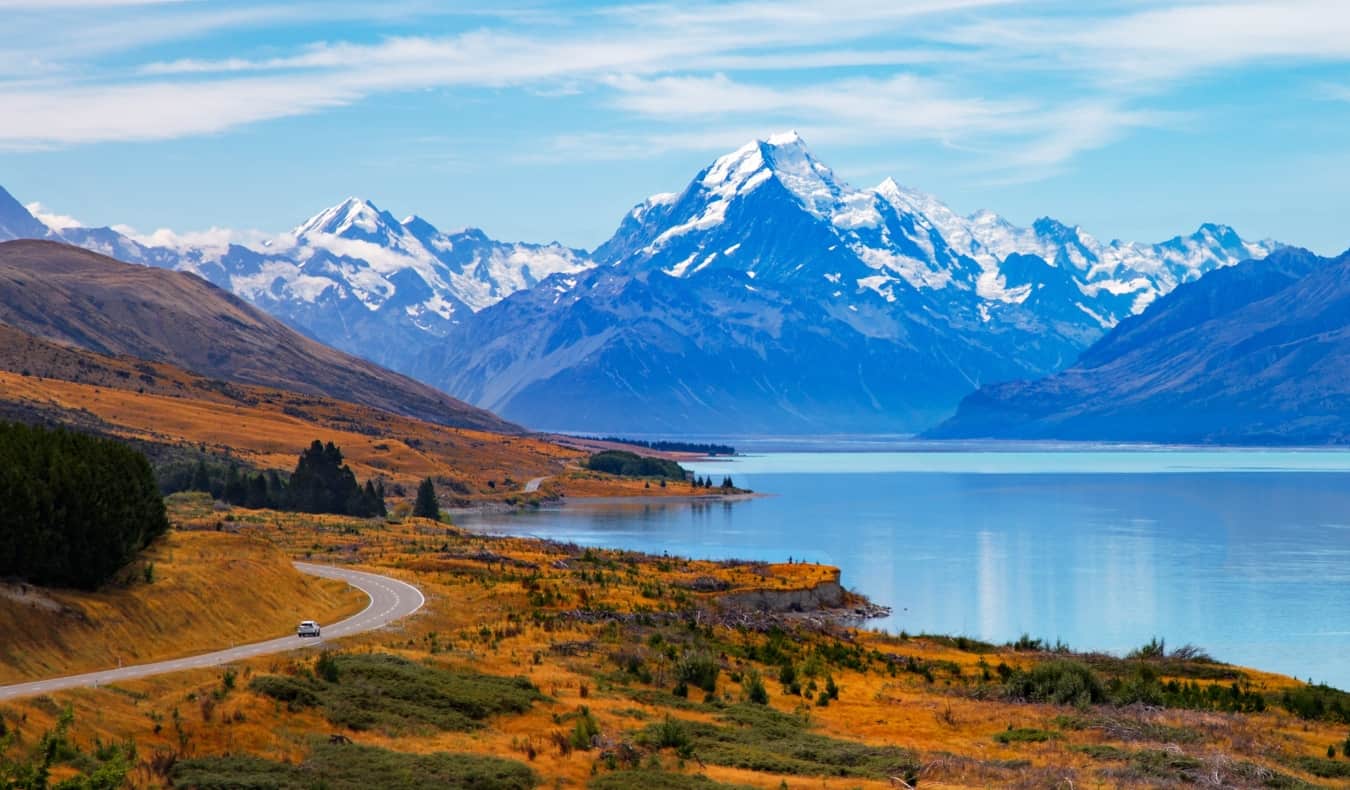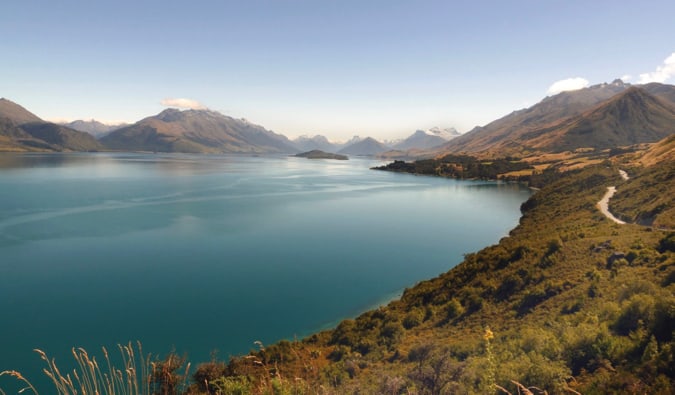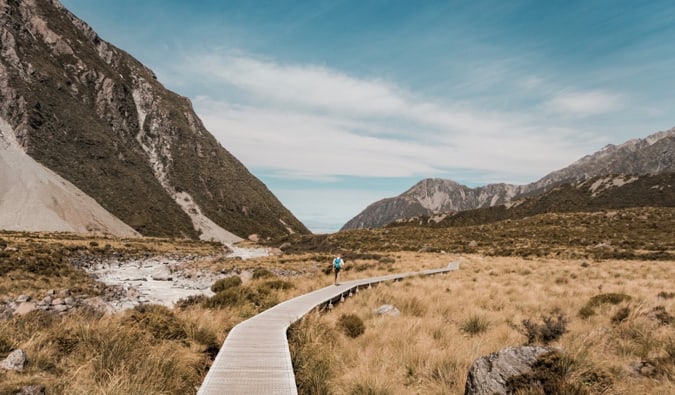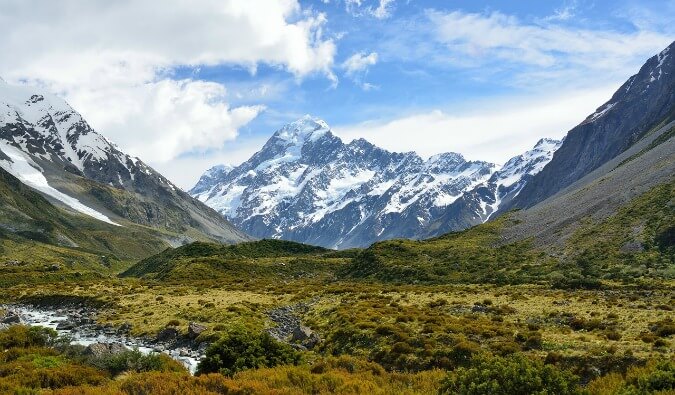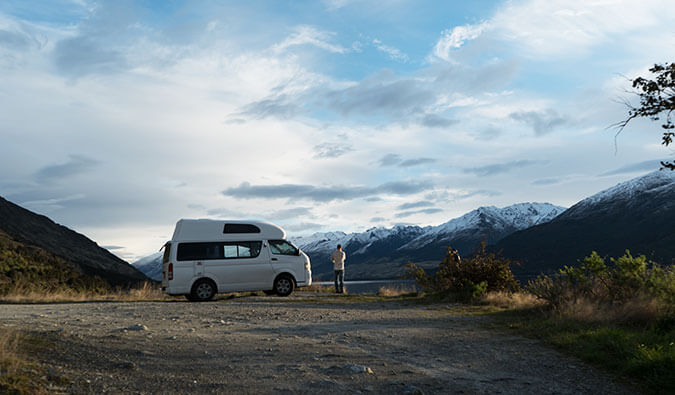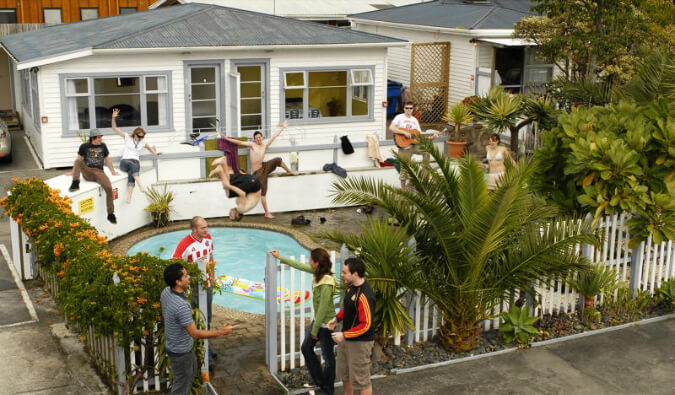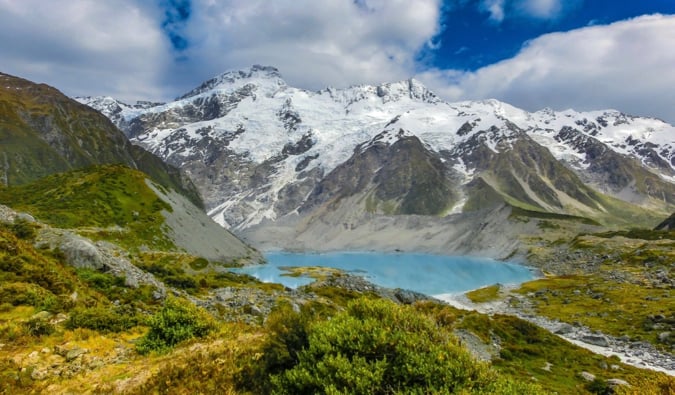
Last Updated: 2/13/23 | February 13th, 2023
New Zealand. The land of Middle Earth, Great Walks, kiwis, backpackers, adventure sports, delicious wine, and pristine remote landscapes.
It’s also a land that sucks all your money from your wallet like a giant vacuum.
I first visited New Zealand over a decade ago. The country was so much more expensive than I thought it would be. Back then, I was a cheap(er) backpacker and focused on saving as much money as I could. I cooked most of my meals, hitchhiked, skipped all the costly adventure sports, and drank a diet of cheap boxed wine and happy hour beer.
But, on my most recent visit, I changed my MO. I was going to say yes to everything — regardless of cost.
I wanted to really know how much money you need in New Zealand for a variety of budgets.
What does it cost to be a broke backpacker? A mid-range traveler? Or a mix of the two?
What if you want to eat out a lot but also hike or sleep in a van? What if you want to do all the adventure activities in the world?
What if you just let the tab pile up?
So I became the Nomadic Matt of many budgeting hats. And, in the process I learned a lot about, the true cost of traveling New Zealand. Let’s break it down.
Table of Contents
How Much Did I Spend in New Zealand?
Over the course of my 25-day visit, I spent 4,550.90 NZD, averaging 182 NZD per day.
That’s a lot of money. Like holy hell a lot of money! Way more than my $50 USD a day guideline.
Here’s how my spending broke down:
- Accommodations: 913.64 NZD (36 NZD/day)
- Spark phone service: 164.68 NZD (6.50 NZD/day)
- Pharmacy: 39.98 NZD (1.60 NZD/day)
- Internet: 15.29 NZD (.60 NZD/day)
- Groceries: 235.52 NZD (9.40 NZD/day)
- Transportation: 1,014.32 NZD (40.50 NZD/day)
- Activities: 823.65 NZD (33 NZD/day)
- Restaurants: 1343.82 NZD (53.70 NZD/day)
Total: 4,550.90 NZD (182 NZD/day)
I spent a lot of money, but, again, I said yes to everything. I knew that taking scenic planes, trains, and helicopter rides; staying in private rooms, and meals out were going to cost a lot of money.
But even I was surprised by how much I spent when I wasn’t tracking my spending.
Looking back, there were plenty of things I could have done to lower my costs.
For example, I could have saved money by eating out less or by booking less expensive Airbnbs instead of hostel private rooms (which are always a terrible deal but I wanted to be around other travelers).
With a lot of ground to cover, I couldn’t always spend a day on a bus so flying really increased my costs. Additionally, the scenic rail I took (while awesome) was also 159 NZD! And transportation to Stewart Island was 160 NZD!
And I definitely blew through way too much phone data. As a person not used to data limits, being data-limited at hostels was new territory for me as I tried to stream Netflix. I picked up the slack on my phone by just ordering more data and not really thinking about it. (This won’t be an issue next time I go back, as unlimited Wi-Fi is standard in most hostels now.)
If I was slightly more conscious about my dining, accommodation, and spending habits, I easily could have cut 30 NZD or more per day from my budget.
How Much Does New Zealand Really Cost?
So, how much do you need to actually budget in New Zealand? If you’re going to travel like I did, budget 200-325 NZD per day. This will let you travel carefree and basically do anything you want (within reason). Fly, take scenic trains, expensive ferries, scenic flights, drink expensive wines, and have expensive dinners – New Zealand is your oyster!
A more “I want to do a lot but still keep things affordable” budget of around 150-225 NZD per day gets you private rooms from Airbnb, a large number of activities (I let no winery go unvisited!), the occasional flight, and restaurant meals about 70% of the time.
If you’re going on a backpacker’s budget, I’d say you need around 70-95 NZD per day. That gets you a hostel dorm room, bus transportation, happy hour drinks, one or two expensive activities (bungy jumping, skydiving, etc.), and self-cooked meals.
If you are going to rent a campervan or self-drive, you could knock 15-25 NZD daily off your budget since your van will act as accommodation too. However, gas prices have risen and fluctuate often so be sure to factor this into your budgeting.
On an even tighter budget, with Couchsurfing, hitchhiking, few if any activities, and cooking 90% or more of your meals, you could get by on 50 NZD per day. It’s not easy to do but I met travelers who did it. It requires a lot of discipline though.
Here are some sample costs:
- Spark Phone plan (with 4.5 GB of data) – 50 NZD (20 NZD with 1.5 GB of data)
- Buses booked far in advance – 30-60 NZD per ride
- Buses booked last minute – 60-100 NZD
- Airfare – Varies wildly but you’re looking at least 50 NZD each way for a domestic flight (double or more if booked last-minute)
- Scenic trains – 99-219 NZD each way
- Full-day Bay of Islands cruise – 135-160 NZD (90 NZD for half-day)
- Hobbiton tour – 82-89 NZD
- Nevis Bungy – 290 NZD
- Franz Josef Glacier Guides Heli Hike – 360-535 NZD
- Waitomo glowworm caves – 61-265 NZD depending on if you walk, raft, or abseil
- Hostel dorms – 25-40 NZD per night
- Hostel private rooms – 80-100 NZD per night
- Airbnb – 65-85 NZD for a private room, 120-150 NZD for an entire apartment
- Wine tours – 85-225 NZD
- Drinks – 9-11 NZD for a beer, 12-15 NZD for a glass of wine, 13-18 NZD for a cocktail
- Casual restaurant meal – 20-25 NZD
- Fast food meal – 14-20 NZD
How to Save Money in New Zealand
Spending so much money taught me a lot about how to save money in New Zealand. Where your budget will go to die in this country is with activities and meals. Adventure activities are crazy expensive, with most of them costing 200 NZD or more!
I mean, a heli-hike in Franz Josef can be upwards of 500 NZD! That’s CRAZY! Moreover, with most meals costing 20-30 NZD, your budget is going to be gone quickly if you eat out a lot (food represented 34.7% of my total spending).
New Zealand’s groceries weren’t that expensive (it’s an agricultural country after all), and there are a lot of free hikes to replace those expensive activities. Taking advantage of these should help lower your costs substantially.
When I was in Wanaka, I only spent around 50 NZD each day (30 NZD for my dorm, 20 NZD for food and drink, and 0 for activities since nature was free!). It can be done.
Simply put, New Zealand doesn’t have to be expensive if you don’t want it to be. After all, if it was, so many backpackers wouldn’t come here in droves.
I mean, how many hordes of backpackers go to Norway? Not a lot! Why? It’s expensive unless you camp the whole time. New Zealand has a middle ground. It’s whatever it is you want it to be.
Here are some tips to help you save money while there:
1. Cook (a lot) – I know this is going to sound crazy, and I can already hear the comments coming, but the food scene in New Zealand isn’t that mind-blowing. Yes, there are nice cafés, some hip gastronomy, and really delicious meals, but nothing that’s so mouth-wateringly delicious you have to blow your budget on it. I never walked away going “That was a meal I couldn’t get at home! I’m glad I just spent sixty bucks!”
No. In fact, my biggest regret is that I spent so much on food. I should have cooked a lot more. I feel like I wasted a lot of money not doing so. I probably could have saved about 800 NZD by cooking more and, honestly, I don’t feel like I would have missed anything too great.
A week’s worth of groceries will set you back between 65-85 NZD. The cheaper supermarkets are Pak’nSave and Countdown.
So, cook as much as possible. You’ll save a ton of money.
2. Choose your tours wisely – Tours cost a lot of money in New Zealand. Going on just a few is enough to bust any budget and send you home before you had planned. Pick the ones you really want to do and save the rest for another trip.
3. Hit happy hour – The backpacker bars have cheap happy hours — take advantage of them. You can also use the app Get Happy to find cheap happy hours in Auckland, Wellington, Christchurch, and Queenstown. If you plan on enjoying a few drinks during your trip, be sure to use this app to save money!
4. WWOOF it – WWOOFing is a way to get free accommodation and food in return for working on a farm or in a B&B. You can do it for a few days or a few months. It’s a popular activity with travelers because it allows you to travel cheaper and for longer.
Keep in mind though that most farms require you to have some experience, as too many inexperienced workers have caused them trouble in the past.
5. Work at a hostel – Many hostels let you trade a few hours of cleaning and making beds for free accommodation. Ask when you check in if this is possible — it might just save you some money! Worldpackers is a great resource for finding opportunities as well.
Additionally, you can also check Backpackerboard.co.nz for temporary paying gigs.
6. Rideshare – Rideshares are a popular transportation option for travelers looking to lower costs — all you need to do is chip in for gas. You can find rides on websites like Craigslist, CoSeats, and Carpool World.
Additionally, you’ll see people asking/offering rides on hostel bulletin boards.
7. Couchsurf – While there are not a ton of Couchsurfing options in the country, there are hosts in all of the major cities. If you don’t mind sleeping on a couch or floor, this is not only a great way to save money on accommodation but you get to meet some amazing locals too.
(Don’t just use this as a free hotel though; it’s a cultural exchange. If you don’t want to interact with your hosts, don’t use this site.)
8. Hitchhike – Hitchhiking is easy in New Zealand. Besides Iceland, it’s probably the easiest country in the world to hitchhike in. There are plenty of people who will pick you up. Additionally, you can just ask around any hostel and find a ride — everyone is doing the same circuit. I got from Wanaka to Queenstown to Fiordland that way.
Between bulletin boards, the Couchsurfing app, the people you meet in hostels, and just thumbing it on the side of the road, you can always find a ride. Check out HitchWiki for more tips.
9. Take a free walking tour – Walking tours are my favorite way to get to know a place. There are a few free walking tours in New Zealand (usually in the larger cities) that offer visitors insight into each destination. Just be sure to tip your guide at the end!
10. Remember that nature is free – New Zealand, home to the Great Walks of the World, has tons of free outdoor activities. While adventure sports, wine tours, glacier treks, and boat cruises can eat into your budget, all the trails and walks are free. You can easily fill your day with free hikes, excursions to the lakes, or days on the beach!
And keep in mind the majority of museums in the country are also free!
11. Get a bus pass – I tend to buy transportation last minute so I never scored super discount fares, which is where bus passes come in. I bought an InterCity FlexiPass, which gave me 15 hours of travel. As of 2023, the pass costs 169 NZD.
I’d suggest this since the passes are hours based and last for an entire year. It will save you a lot of money versus booking last-minute tickets on the bus. Passes range from 10 hours (139 NZD) to 80 hours (641 NZD).
You can find out more on how to get around on a budget in this post. I list a lot of resources there.
12. Skip the backpacker buses – While they’re fun, backpacker bus tours like the Kiwi Experience are expensive! Best to avoid them if you are on a tight budget. If your budget isn’t so tight and you do want to check them out, be sure to sign up for their mailing lists first — there is always a sale on.
13. Use Book.me.nz – This website provides last-minute discounts on activities (and pub crawls) throughout the country. If you’re flexible about when you want to do things, you can save up to 60% off attractions and activities! I can’t recommend it enough. It saved me a lot of money.
14. Travel by campervan – Campervans are a win for budget-conscious travelers as they serve as both accommodation and transportation. New Zealand is especially suited to traveling by campervan, especially on the nature-heavy South Island where people hike and camp. Be sure to download the awesome Campermates app, which shows you nearby campsites, gas stations, and dump stations.
For even more savings, look into campervan relocation, where companies need to move vans from one location to another. As the driver, you’ll get steeply discounted rates and perks like extra days and free fuel for doing so. Check out Coseats and Transfercar to get started.
Saving money in New Zealand is about picking and choosing your battles. As you can see, when you just don’t care, costs can skyrocket. I made plenty of spending choices that drastically upped my daily average.
But if you get a bus pass, cook a lot of your meals, find rideshares, stick to Airbnb rooms (or split rooms with friends), or campervan it, New Zealand won’t be that expensive.
Just be sure to watch your budget!
Book Your Trip to New Zealand: Logistical Tips and Tricks
Book Your Flight
Use Skyscanner to find a cheap flight. They are my favorite search engine because they search websites and airlines around the globe so you always know no stone is left unturned!
Book Your Accommodation
You can book your hostel with Hostelworld as they have the biggest inventory and best deals. If you want to stay somewhere other than a hostel, use Booking.com as they consistently return the cheapest rates for guesthouses and cheap hotels. My favorite places to stay are:
- Nomads (Queenstown)
- Urbanz (Christchurch)
- Trek Global (Wellington)
If you’re looking for more places to stay, here is a complete list of my favorite hostels in New Zealand.
Don’t Forget Travel Insurance
Travel insurance will protect you against illness, injury, theft, and cancellations. It’s comprehensive protection in case anything goes wrong. I never go on a trip without it as I’ve had to use it many times in the past. My favorite companies that offer the best service and value are:
- Safety Wing (best for everyone)
- Insure My Trip (for those over 70)
- Medjet (for additional evacuation coverage)
Looking for the Best Companies to Save Money With?
Check out my resource page for the best companies to use when you travel. I list all the ones I use to save money when I’m on the road. They will save you money when you travel too.
Want More Information on New Zealand?
Be sure to visit our robust destination guide on New Zealand for even more planning tips!
